|
Lytham Cottage Hospital was officially opened on Thursday 3
August 1871.
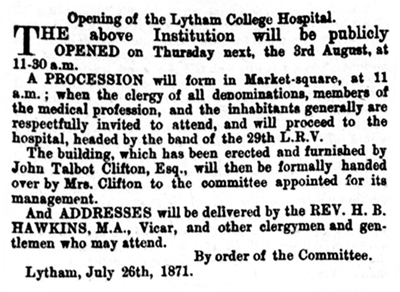
----------------------------
Below is a newspaper report of the ceremony with some additional
illustrations.
Preston Chronicle - Saturday 05 August 1871
OPENING OF LYTHAM COTTAGE HOSPITAL.
Thursday last was a red letter day at Lytham, on account of the
opening of the Cottage Hospital, erected by Mr. J. T. Clifton, and the exhibition
of the Floral and Horticultural Society. Flags floated in all directions, and in
the morning the villagers were all astir, and it was evident that something of
importance was about to take place.
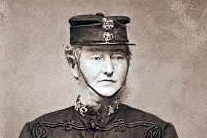
John Talbot Clifton
(1819-82).
As regards the hospital, which was opened at noon by Mrs.
Clifton, we may state that it has been furnished for the purpose of affording
relief to poor people in case of sickness and accidents. It occupies a most
commanding appearance, being situate at the east end of the town, and approached by
a beautiful walk. The building consists of two wards, on the ground floor, each
containing four beds - one for males and the other for females. Upstairs there are
also two wards. On the ground floor there is also a room for the matron, a
committee room, surgery, bath room, wash-house. There is a mortuary in the yard,
and an operating room for cases of a severe nature. The beds are upon Mr. Allen's,
of Bristol, Patent Hospital Beds, and in the hospital there will be a supply of
necessary surgical instruments.
The architect is Mr. Henry Littler, the gentleman who is
officiating in a like manner at Whittingham Asylum, and it has been erected from a
sketch by Dr. Holland, of Prestwich Asylum. The contractors were - Mr. Richard
Butcher, Lytham, builder; Mr. George Smith, Marton, joiner; and the painting was
done by Messrs. Park, of Theatre-street, Preston.
The building is a centre of two stories, and made of bricks and
"cobbels." The foundation stone was laid in September last, and the total cost of
its erection is £1,200, which has been wholly defrayed by Mr. and Mrs. Clifton. The
matron appointed is Mrs. Sinclair, a lady of considerable experience, who, for many
years, was one of the principal nurses at St. George's Hospital, London. The
grounds are extensive and admirably laid out, and the whole structure reflects
great credit upon the munificence of Mr. Clifton.
A committee of management has been formed and consists of the
following gentlemen :- J. B. Greenwood, Mr. Edmundson, Mr. T. Fair, Dr. Fisher, Mr.
Knowles, Mr. B. Rodway, and Captain Whalley.
A code of rules has been drawn up explanatory of the objects of
the hospital and for its management. Subjoined is a copy:
1. The hospital is designed for the accommodation of the
poor, when suffering from sickness, or from accident.
2. The establishment shall consist of a regular nurse, and another woman for
the necessary work of the house.
3. Patients shall be received on the payment of a weekly sum (not being less
than 6d. A day) the amount of which, dependent on their circumstances, is to be
fixed by the person recommending, in conjunction with the manager of the
hospital. Infectious cases, and patients suffering from advanced pulmonary
consumption, or who are of unsound mind shall be ineligible for admission
unless with the special sanction of the committee.
4. Admission of patients shall be granted by the manager, in consultation with
the medical officer.
5. The medical department shall be under the control and superintendence of
Luke Fisher, Esq., M.D.; but medical who have attended their cases previous to
their admission, may continue their treatment if they desire to do so.
6. Every requisite shall be provided in the hospital, and patients may not
receive or food or drink from any source without the sanction of the medical
officer.
7. The funds for the establishment and support of the hospital shall be raised
by voluntary contributions, and a statement of the receipts and expenditure
shall be printed once a year, and duly forwarded to each subscriber.
8. That all subscriptions shall be payable yearly and in advance on the 1st
July, and any of the committee may receive donations and subscriptions, an
account of which shall be rendered to the treasurer.
9. The furniture and all other hospital property, shall be vested in the
committee for the time being.
10. That the committee shall be entirely free from religious or political bias,
and that the clergy and ministers of all denominations shall have free access
to the hospital for the purpose of visiting any patients who may be members of
their respective congregations.
Shortly after 11 o'clock on Thursday morning a procession was
formed in Market-square, and headed by the band of the 29th (Lytham) Rifle
Volunteers, about fifty gentlemen proceeded to the hospital. The building was first
inspected; afterwards they repaired to the front entrance near which a platform had
been erected. Amongst the gentlemen present we noticed Mr. J. B. Greenwood,
chairman of the Committee; Rev. H. B. Hawkins, vicar of Lytham, Rev. R. S. Stoney,
Rev. E. C. Green, curate of Lytham, Rev. S. Clarkson, congregational minister,
Capt. Wykeham Clifton, Messrs. Thomas Fair, Jacob Fair, R. Clark, R. Edmondson,
Lees, R. Threlfall, &c. There was also a large attendance of ladies, amongst
whom were - : Lady Bertha Clifton, Mrs. T. Fair, Mrs. J. W. Fair, Mrs. Stoney,
&c.
A photograph of the ground around the platform was taken by Mr.
Hedges, of Lytham.
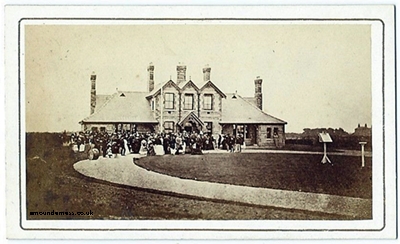
This is the photo taken by David Hedges at the
opening ceremony on 3 August 1871.
It is thought to be the earliest photo of any major
event or ceremony in Lytham.
The hospital site was then well out of town and set in
a flat, almost treeless landscape.
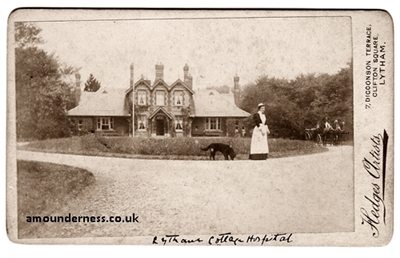
Another photo taken by David Hedges
c1881.
Mrs. CLIFTON, on making her appearance, was received with
cheers, and in handing over the building to the Committee said:
"Ladies and gentlemen this building has been erected by
Mr. Clifton as a cottage hospital for the benefit of the town and
neighbourhood, in order that relief and comfort may be obtained in cases of
serious accidents or illness, where such cases could not be so carefully
attended to in the cottages of those who are unable to provide for to sickness
at home.
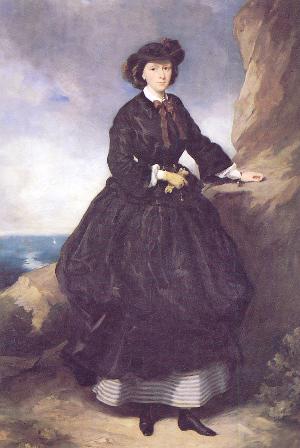
Eleanor Cecily Clifton
(1822-1894).
In the name of Mr. Clifton, who, I regret, has
been unable to reach Lytham in time to meet you here to-day, I hand over this
hospital to the town of Lytham and the Committee who have so kindly taken the
responsibility of its management for the future. I hope the hospital may prove
a benefit to the town." (Applause.)
Three cheers having been given for Mr. and Mrs. Clifton, Mr. J.
B. GREENWOOD said:
"Ladies and gentlemen, the Committee, on behalf of the
town and neighbourhood of Lytham, I beg to offer to Mr. and Mrs. Clifton their
grateful thanks for the munificent gift of the cottage hospital. Amongst the
numerous acts of generosity that have characterised the Clifton family in
Lytham none will be more widespread or perpetuated in its influence than this,
which provides relief to the afflicted, and health to the sick for generations
to come, evincing also as it does an exemplary Christian thoughtfulness that
prompted the execution of so benevolent an object. (Applause.)
The Committee would not overlook the deep interest which
Mr. and Mrs. T. H. Clifton have taken along with Mr. and Mrs. Clifton in the
construction of this charitable institution, and would pray that upon them also
with their distinguished parents may descend "the blessing of them that are
ready to perish." (Cheers.)
Rev. H. B. Hawkins then stepped forward, and said that he hoped
the representatives of the committee would allow him to endorse what Mr. Greenwood
had stated. He most fully, as well as those present, felt the great debt which they
as inhabitants of Lytham as to the way in which the hospital had been made over to
them that day. They now entered into possession of it, and they owed a debt of
gratitude to Mr. and Mrs. Clifton for the present of it.
He was reminded of the position they were in about this time
last year when they were called upon to witness the laying of the foundation stone.
They saw it laid, and by the aid of certain plans what the edifice would be like,
but his imagination then fell short of what they now saw before them. In the place
of that one single stone they now had grown up that beautiful structure, enclosed
in those ornamental and well laid out grounds. The committee had for the better
management of the hospital drawn up a code of rules from the experience of other
cottage hospitals, and compiled from those which they thought best to suit the work
of that establishment.
At the commencement the rules told them for what purposes the
hospital was designed for the accommodation of the poor when suffering from
sickness or from accident. When they spoke of the poor suffering from sickness
those who had most to do with the subject were well aware of the large amount that
want seemed to supply, and those who had visited the cottagers in sickness at their
own homes, and the comfort which would be supplied to them here, were capable of
judging the benefit that establishment would confer upon them.
They all knew of the inconvenience resulting from crowded homes
and the difficulty of supplying the necessary sanitary arrangements, of the
impossibility of procuring food and nursing, of the admission of sunshine and air,
but they had just seen the efforts made in that building to supply those wants. The
whole arrangements were very great advantages, and it might seem to some that they
were greater than those offered to the poor in larger establishments or the
Infirmary.
Those who were acquainted with that matter knew there were
certain difficulties of procuring the admission of patients in those
establishments. The distance and size of them often made those who were admitted
think that they were received with resentment. They pleaded that it was utterly
unlike their own home, that they were away from their friends and scarcely heard
from them, but all those obstacles could not be urged against the cottage hospital;
it was near, caused no separation of friends, and were like their homes in their
appliances and surroundings. He expressed his pleasure at the arrangements for
accidents, observing that many a time through loss of time there was loss of
life.
In the second rule there was alluded to persons suffering from
advanced pulmonary consumption and infectious cases, stating that they would be
ineligible for admission. It had I been asked why those cases should not be
admitted, and he was of opinion that the answer to it was obvious and lay in a nut
shell, for those who required surgical aid would be l excluded, as it would not be
safe to place them in contact with infectious cases.
Another rule stated that patients should be received on the
payment of a weekly sum not less than 6d. a day, which meant that as far as
possible the hospital should be self-supporting. He invited gentlemen to subscribe
towards the maintenance of the hospital, and that they would show their interest in
the day's proceedings by giving handsome subscriptions.
He congratulated the committee on their arrangements, and wished
for their management a prosperous issue. He would again thank Mr. and Mr. Clifton
for their present that day, and knew that all present would join with him when he
said he did pray for the divine blessing to rest on all the endeavours made in that
house to alleviate such suffering and such sorrow as it might please His divine
will hereafter to send. (Applause.)
He had now a very agreeable duty of declaring the cottage
hospital open. (Applause.)
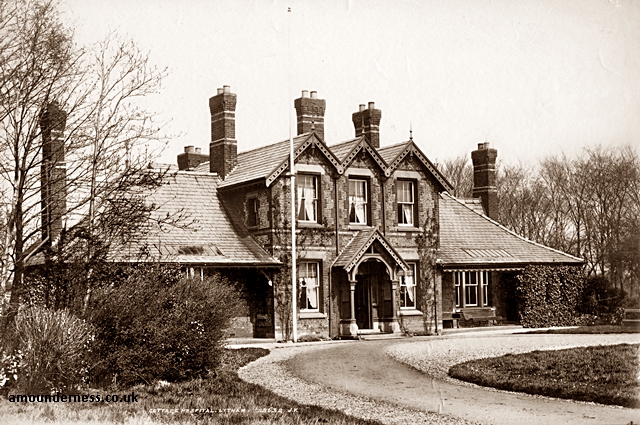
Lytham Cottage Hospital
c1893.
Rev. S. Clarkson endorsed the remarks of Mr. Hawkins, and was
sorry that Mr. Walmsley and Mr. Lees were not with them but he was sure that all
denominations of Christians felt that they owed a debt of gratitude to Mr. and
Clifton for the most munificent and philanthropic present.
To show their gratitude they should be liberal, and he would be
glad to become an annual subscriber to the institution, and he had no doubt it
would meet with ample support. (Applause.) Cheers again having been given to the
donors of the hospital, the proceedings terminated.
|